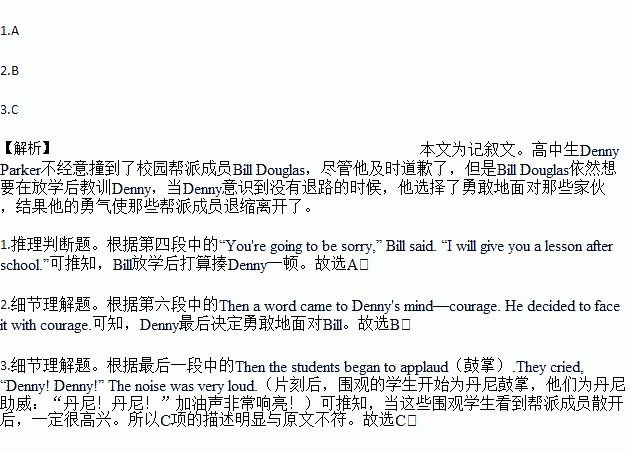题目内容
Denny Parker lived in a bad place. Because of a youth gang(帮派), he wanted to leave the area. The gang often caused trouble in the high school. As he was walking out of history class one day, Denny bumped(撞上) into another student. “Sorry,” he said, and kept walking. But he was stopped. Turning around, he found himself facing a very large, angry boy. It was Bill Douglas, a member of the gang!
“Hey,you pushed me!” Bill cried.
“Come on, Bill,” answered Denny, “I said I was sorry.”
“You're going to be sorry,” Bill said. “I will give you a lesson after school.”
“Oh, no,” thought Denny, hurrying to his next class. “I'm in trouble now.” The more he thought about it, the more fearful he became.
Then a word came to Denny's mind—courage. He decided to face it with courage. He had nothing to lose—except a few teeth. After school, many students waited on the corner. News had spread that there would be a fight. Bill Douglas and his gang were waiting, too.
“Hey, Parker,” Bill laughed as Denny walked near. “Let me teach you a lesson.”
Denny answered loudly, “Well, come on. I'm not afraid.”
There was silence. Then the students began to applaud(鼓掌).They cried, “Denny! Denny!” The noise was very loud. The gang members ran away one by one. Denny won with his courage.
1.Bill was going to _________.
A. give Denny a good beating
B. teach Denny how to fight
C. teach Denny how to be polite
D. talk about some problems with Denny
2.What decision did Denny make at last?
A. He needed to say sorry to Bill.
B. He should face Bill with courage.
C. He must tell the teacher everything.
D. He had to ask the other students for help.
3.Which of the following is NOT true?
A. The students hoped that Denny would win the fight.
B. At first, Denny was afraid that the gang members would beat him.
C. The students were unhappy when they saw the gang members run away.
D. At first, Bill thought that Denny was afraid of him.
 天天向上一本好卷系列答案
天天向上一本好卷系列答案 小学生10分钟应用题系列答案
小学生10分钟应用题系列答案
